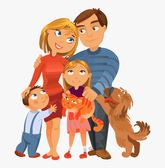|
Whenever possible, you should observe the puppy’s mother and father. Are they friendly and sociable around kids? Granted, temperament is also influenced by environment, but at least some of a puppy’s disposition is inherited. This is why it pays to see how mom and dad interact as well. As a huge proponent of rescues, I feel it is very possible that you can adopt a wonderful dog that turns out to be a fabulous companion for your children. Getting a puppy at 8- to 10-weeks of age enables you to create the experiences that will shape his personality. Although puppyhood can be trying, getting a young dog is the best way to ensure (as much as anyone can ensure behavior) that his personality develops into the child-loving, good-natured companion you desire. Remember that a dog’s breed is not a guarantee of the dog’s behavior. Whether you get a puppy or an older dog, it is important to observe his or her behavior prior to adoption or purchase. Is the dog fearful or skittish? Is the dog comfortable being handled? Is he/ she friendly without being insanely rambunctious? You are looking for a dog that is very comfortable around people, one that is not fazed by sudden movements or being touched or hugged. Basically, you need a dog that will not react negatively to the types of behavior the average small child will engage in with his or her doggie. Here is a very short list (by no means complete) of some excellent breeds for small children. Labrador Retriever Labs are wonderful, friendly dogs. They are usually eager to please and tolerant of the sort of handling little tykes so often dole out. They are sturdy too, which is important with small kids. You will need to train the dog so he or she learns to be gentle and not knock the kids over out of sheer joy and exuberance. Golden Retriever They are very similar to Labs, although in my experience sometimes a bit calmer. They do shed a bit more than Labs. Basset Hound I will admit to being a bit biased on the topic of Bassets. I have “been owned” by them for the past few decades. That said, my preference is based on experience. Bassets are often islands of calm, which is nice. The topic of which breeds of dogs are the best breeds is always guaranteed to stir up healthy debate. Why? Most people have breed preferences. As a dog trainer for more than 30 years, I can say without reservation that it is important to remember that each dog is an individual, regardless of its breed. I have seen some breeds not normally considered suitable for small children act as perfect pets and companions, while others that are very commonly considered great choices for kids were absolutely not okay around them. I do not say this to cause confusion, but to educate all readers about the necessity of taking a few other precautions when bringing a dog into a family with small children. Every dog is an individual and if you are introducing a dog into a home with children, you should do research before you choose the right dog for your family. when the kids are bouncing off the walls. They tolerate the roughest treatment with a shrug and tail wag. They are goofy, friendly, wonderful dogs. A downside is they sometimes have a pretty distinctive hound smell, which is not for everyone. Still, these are amazing kid-friendly dogs. One other thing: they can get bigger than a lot of people realize. Males can weigh 85-plus pounds, making them a handful. Newfoundland Strange choice? Not really. These gentle giants are great kid dogs. They are calm, loving, and infinitely tolerant. The only things to understand about the breed are 1) They often don’t live very long, only 8 to 11 years, and 2) they shed—and drool. Plus, well, they are huge, which poses its own challenges. Still, if you are looking for a lot of dog that is great with kids, this can be a very wise choice. Standard Poodle This is a good pick for children or parents with allergies. Poodles are highly intelligent and friendly, have good temperaments, and are good with children. Standard poodles are sturdy dogs who can withstand a fair amount of rough kiddie treatment. I have always liked this breed and over the years have seen numerous families with these dogs. You will notice I did not pick any smaller breeds — bichon frise, cocker spaniels, etc. In my experience, the average one- to four-year-old child is, by his or her very nature, too rough for smaller breeds. It is better to choose a larger dog that can deal with small children’s normal behavior than delude yourself into thinking you will be able to monitor their interaction and thus keep everyone safe. Remember there is risk for the dog as well as the child. Again, remember that every dog is an individual and if you are introducing a dog into a home with children, you should do research before you choose the right dog for your family.
0 Comments
Leave a Reply. |
Archives
July 2024
Categories |


 RSS Feed
RSS Feed